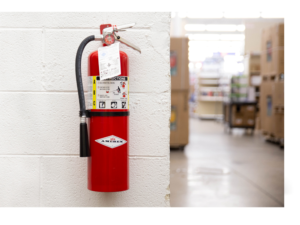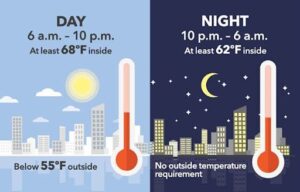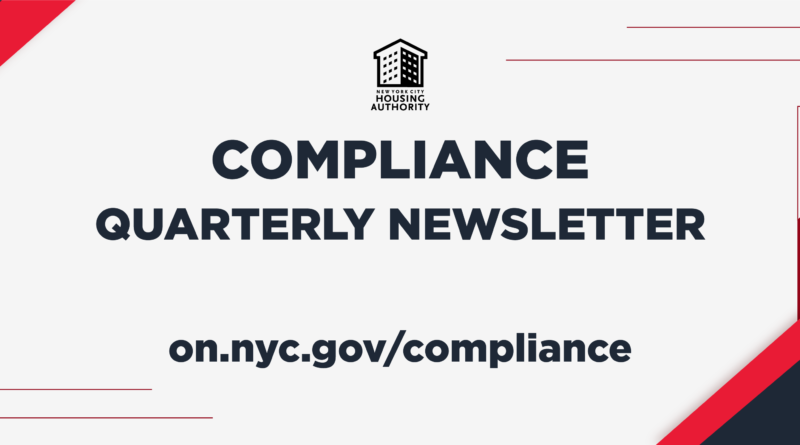Inspiring a Compliance Culture
Read the Compliance Department’s Quarterly Newsletter
Fire Safety
October is National Fire Safety Month, and October 3 through October 9, 2021, is National Fire Prevention Week, which is observed every year to raise fire safety awareness. This edition of the Compliance Quarterly Newsletter observes Fire Prevention Week by promoting fire safety at NYCHA developments.
Fire Safety Standard Procedure
The Procedures Unit in the Compliance Department posted Standard Procedure (SP) 040:04:3, Fire Safety to the Forms and Reference Library in February 2021. The Fire Safety SP was updated to include four other standard procedures, creating one comprehensive fire safety document. The Fire Safety SP provides instructions to ensure compliance with federal, State, and City fire safety laws and regulations; by outlining fire safety processes such as:
- Regular inspections of fire protection systems and equipment, including fire extinguishers, fire alarms, sprinklers, standpipes, and range hoods;
- Posting and distributing fire safety notices and information;
- “5 ALIVE” fire safety checks when performing work in an apartment;
- Requirements for conducting fire drills at developments; and
- The role of vendors in performing fire safety inspections and repairs.
The SP must be read by all employees who operate and maintain NYCHA buildings, offices, or facilities located at NYCHA developments. All property managers, property maintenance supervisors, location supervisors, and Fire Safety Unit supervisors must review the SP and its requirements with applicable employees. If property management employees have any questions about their development’s fire protection systems, they can email the Fire Safety Unit at firesafetyunit@nycha.nyc.gov.
On-Site Monitoring
As previously discussed in the April Newsletter, the Monitoring Unit in the Compliance Department continues to work with the Environmental Health and Safety (EH&S) and Quality Assurance (QA) departments to perform on-site monitoring at NYCHA developments, visiting six developments in the third quarter of 2021. The EH&S Fire Safety Oversight Team (FSOT) performs inspections of fire protection systems and reviews open violations issued by the New York City Fire Department as part of these monitoring efforts. Following the FSOT inspections, the Monitoring Unit works with property management employees to correct any deficiencies. Common deficiencies identified include unsecured sprinkler control valves, missing drain valve identification signs, and missing or outdated pressure gauges. For complete information on the inspection requirements for fire protection systems, refer to SP 040:04:3, Fire Safety.
Vendor Inspections
 Additionally, the Contractor and Employment Opportunity Compliance (CEOC) Unit in the Compliance Department partnered with EH&S to perform site visits to review the contract performance of vendors who perform inspections of fire alarm panels and fire extinguishers. CEOC and EH&S are in the process of reviewing observed deficiencies and will work with developments and vendors to ensure that any issues identified are completed to address these deficiencies.
Additionally, the Contractor and Employment Opportunity Compliance (CEOC) Unit in the Compliance Department partnered with EH&S to perform site visits to review the contract performance of vendors who perform inspections of fire alarm panels and fire extinguishers. CEOC and EH&S are in the process of reviewing observed deficiencies and will work with developments and vendors to ensure that any issues identified are completed to address these deficiencies.
Based on these reviews, CEOC and EH&S have identified some common concerns that NYCHA employees should consider when performing or working with vendors to perform fire safety inspections. When performing monthly fire extinguisher inspections, employees must record the results on NYCHA Form 040.521, Monthly Fire Extinguisher Inspection Log and document the inspections on the back of the fire extinguisher tags. When a certified fire safety vendor performs annual fire extinguisher inspections, employees must ensure that the vendor records inspection results on NYCHA Form 040.506, Fire Extinguisher Inspection Log and replaces any expired tags.
Compliance Advisory Alert #18 – 5 ALIVE Safety Check
The Compliance Department published Compliance Advisory Alert #18 in September 2021 to remind employees to perform the 5 ALIVE Safety Check when making repairs or performing inspections in apartments. There are five things employees must check for, fix or install, and document immediately on the Maximo work ticket under the Apartment Adhoc Inspection Data section:
Alarms – ensure smoke and carbon monoxide detectors are properly installed and working.
Ledges – check the proper installation of window guards in apartments with children (except at fire escape window exits).
Info – confirm a legible fire safety notice is posted on the back of the apartment door.
Volts – test ground fault circuit interrupter outlets (GFCI outlets).
Entrance – test doors to ensure they are self-closing and have a functioning latch.
Information on how to complete these safety checks can be found in SP 040:09:3, Periodic Apartment Inspections, including in Appendix D.
Fire Safety and PHAS REAC Inspections
Fire safety is an important part of Public Housing Assessment System (PHAS) Real Estate Assessment Center (REAC) inspections. As a reminder, when preparing for PHAS REAC inspections, property management employees must ensure that all fire safety inspection logs are updated monthly in the PHAS binder. Post-inspection, certain fire safety deficiencies (such as blocked fire exits, missing exit signs, and exposed wires) are considered Exigent Health and Safety deficiencies, which threaten the life, health, and/or safety of a resident and/or employee. These deficiencies must be corrected and certified as resolved within three days of a citation. For more information on PHAS REAC inspections and Exigent Health and Safety deficiencies, see SP 040:18:1, Repair Standards and PHAS REAC Inspections.
Heating
Heating Season
 October 1, 2021, marked the official start of New York City’s heating season, which runs until May 31, 2022. During heating season, all New York City building owners (including NYCHA) must maintain minimum indoor temperatures at their buildings. Between 6 a.m. and 10 p.m., temperatures must be at least 68 degrees whenever the outside temperature falls below 55 degrees. Between 10 p.m. and 6 a.m., temperatures must be at least 62 degrees, regardless of the outside temperature. There are additional requirements for NYCHA senior developments and buildings with indoor temperature sensors, which can be found in SP 060:63:1, Heating and Domestic Hot Water.
October 1, 2021, marked the official start of New York City’s heating season, which runs until May 31, 2022. During heating season, all New York City building owners (including NYCHA) must maintain minimum indoor temperatures at their buildings. Between 6 a.m. and 10 p.m., temperatures must be at least 68 degrees whenever the outside temperature falls below 55 degrees. Between 10 p.m. and 6 a.m., temperatures must be at least 62 degrees, regardless of the outside temperature. There are additional requirements for NYCHA senior developments and buildings with indoor temperature sensors, which can be found in SP 060:63:1, Heating and Domestic Hot Water.
With the start of the heating season, property management employees should be aware of their responsibilities related to heating. Among other duties, property management employees must perform monthly inspections of heating plants and daily inspections of boiler rooms. Additionally, during heating season, maintenance workers must record apartment and hot water temperature readings on all maintenance work orders. For a full list of responsibilities related to heating, see SP 060:63:1, Heating and Domestic Hot Water.
In preparation for heating season, the Heating Management Services Department (HMSD) performed their annual preventive maintenance of heating plant equipment. That involves inspecting, cleaning, and repairing all equipment at heating plants to ensure it is in good condition. The annual preventive maintenance was revised this year to include new documentation of the process, incorporate new tools like the fire tube cleaning machine for cleaning boilers, and include a systematic quality assurance inspection.
Conclusion
The Compliance Department will continue working with our colleagues to ensure that NYCHA is a safe and healthy place for our residents, employees, and vendors. If you have any concerns or complaints, you can make a confidential and anonymous report by calling the Customer Contact Center at (718) 707-7771 (select menu option 7) or by visiting the Compliance Department section of NYCHA’s website. Complaints also can be reported to any other federal, state, or local government entity. Remember, the Compliance Department is here to help.
90 Church Street
New York, NY 10007
https://on.nyc.gov/submit-concern







